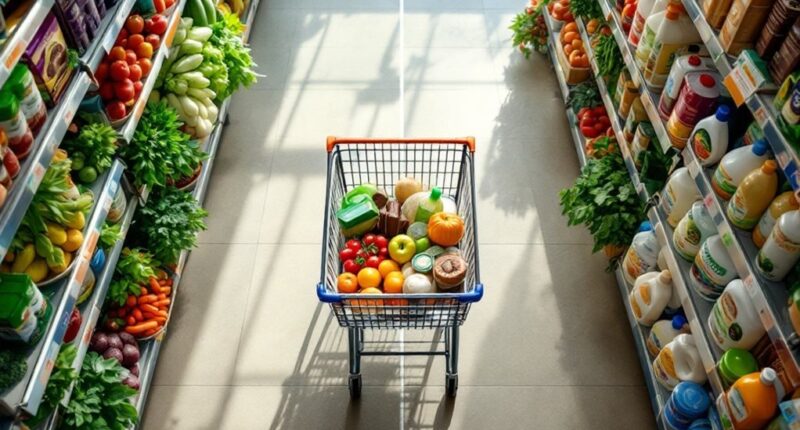Ethical consumption has transformed grocery stores into moral battlegrounds where shoppers weigh more than just price and quality. Today’s consumers consider climate impact, labor practices, and animal welfare alongside their budgets. Despite challenges like higher costs and limited availability, this values-based purchasing wields significant market influence, pushing companies toward sustainable practices. While perfect ethical consumption remains elusive, each mindful choice contributes to a marketplace where ethics rival economics in importance. The journey toward conscious consumerism offers surprising rewards beyond the shopping cart.

Although consumers have always made choices about what to buy, the modern marketplace has transformed these simple decisions into complex moral calculations. Today’s shoppers aren’t just weighing price and quality—they’re considering whether their purchase might be contributing to climate change, exploitative labor practices, or animal suffering. It’s like trying to solve a cosmic equation while standing in the grocery aisle with a shopping cart and a growling stomach.
The grocery store is now an ethical battleground where every banana and T-shirt hides a moral dilemma.
The reality is that ethical consumption comes with significant hurdles. Price remains the heavyweight champion of purchase deterrents—ethical products typically sport heftier price tags than their conventional counterparts. Imagine trying to save the planet while also saving for retirement; sometimes the wallet wins that wrestling match. Accessibility presents another roadblock, with ethical options often playing hard-to-get in mainstream retail environments. The intention-action gap frequently prevents consumers from following through on their ethical intentions due to convenience and price constraints.
Despite these challenges, ethical consumerism is flexing its market muscle. Companies are increasingly adopting sustainable practices not just for the warm fuzzies but because consumers are voting with their dollars. The growth in plant-based products alone—from humble tofu to impossibly beef-like burgers—shows how consumer values can reshape entire industries faster than you can say “oat milk latte.” Consumers are increasingly leveraging their purchasing power to support businesses with ethical practices and encourage positive change in the market.
Savvy ethical shoppers have developed practical strategies to navigate this terrain. They research brands like detectives on a moral mission, look for trusted certifications (those little symbols are the VIP passes to ethical consumption), and sometimes simply buy less stuff—turns out “reduce” is the overachiever of the “reduce, reuse, recycle” trio.
Social influence plays its part too. When your neighbor starts composting or your coworker brings a reusable coffee cup to the office, these small acts normalize ethical choices. It’s peer pressure’s virtuous cousin.
The ethical consumption landscape continues to evolve with trends like circular economy initiatives and transparent supply chains gaining traction. While perfect ethical consumption might remain elusive—like trying to catch fog in a net—each values-based purchasing decision contributes to a marketplace where ethics matter as much as economics.
Frequently Asked Questions
How Do I Verify a Company’s Ethical Claims?
To verify a company’s ethical claims, consumers should examine transparency through sustainability reports and supply chain disclosures.
Legitimate certifications like Fair Trade or B Corp can be cross-referenced with certification databases.
Third-party assessments from organizations like Ethical Consumer provide independent verification.
When analyzing marketing claims, look for specific measurable statements rather than vague promises.
Watch for greenwashing tactics that use environmental imagery without substantive practices behind them.
Does Ethical Consumption Actually Make a Difference?
Research indicates ethical consumption does make a difference. Market data shows significant growth in ethical product spending (35% increase to £141.6 billion in 2021) despite economic challenges.
When consumers vote with their wallets, companies respond by improving practices. However, impact is limited by verification difficulties, price barriers, and “greenwashing.” Most effective when collective consumer choices push for systemic change rather than relying solely on individual responsibility—as 58% of consumers believe too much burden falls on individuals.
Are Ethical Products Always More Expensive?
Ethical products typically command higher prices, but the relationship isn’t absolute. While sustainable items average 75-80% more expensive due to fair labor practices and quality materials, this isn’t universal.
The “expensive” label often overlooks long-term value—ethical products frequently last longer, reducing the cost-per-use equation. Conventional products appear cheaper because their true costs are externalized to society and the environment.
As ethical markets grow, economies of scale may eventually bridge this price gap.
How Can I Prioritize Different Ethical Considerations?
Prioritizing ethical considerations requires a personal values audit. Consumers should first identify what matters most to them—environmental impact, worker rights, animal welfare, or local economics.
Creating a hierarchy helps navigate tradeoffs when perfect products don’t exist. Some use a mental scoring system, giving more weight to deal-breakers like child labor. Others focus on high-impact categories first, tackling food choices before worrying about office supplies. The key? Consistent progress over perfection.
What Certifications Are Most Reliable for Ethical Products?
Among the most reliable ethical certifications, Fairtrade International stands out for ensuring fair wages, while B Corp evaluates overall social and environmental impact. For textile products, GOTS certification verifies organic production standards. Rainforest Alliance focuses on environmental sustainability, and Leaping Bunny guarantees cruelty-free practices for cosmetics.
The most trustworthy certifications share common traits: third-party verification, transparent standards, supply chain monitoring, and clear consumer communication about their ethical guarantees.









